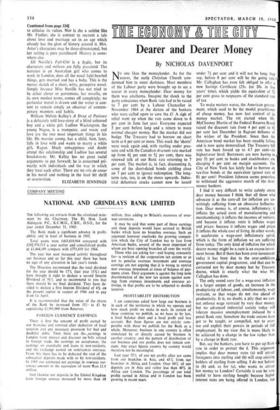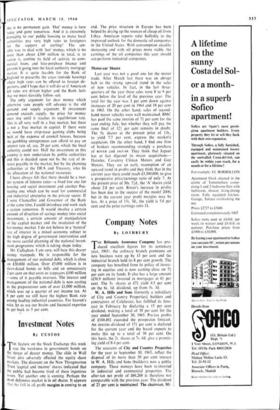'THE lEgetHillf A 'THE NWT
Dearer and Dearer Money
By NICHOLAS DAVENPORT
No one likes the moneylender. As for the usurer, the early Christian Church con- demned him to outer darkness. Most members of the Labour party were brought up to see a usurer in every moneylender. Dear money for them was anathema. Imagine the shock to the party conscience when Bank rate had to be raised to 7 per cent by a Labour Chancellor in November 1964 at the dictate of the bankers who were called upon to save the £1 A sigh of relief went up when the rate came dowq to 6 per cent in June last year. Everyone expected 5 per cent before long and a return to more normal cheaper money. But the market did not budge. The Treasury had to borrow on short term at 6 per cent or more. This week the 'shorts' were weak again and, with sterling under pres- sure and with the Canadian discount rate marked up from 44 per cent to 51 per cent, there .was renewed talk of our Bank rate returning to 7 per cent. The market is, in fact, discounting it, some of the short-dated bonds yielding close on 7 per cent to (gross) redemption. The long- term rate, too, is on the move upwards. Indus- trial debenture stocks cannot now be issued under 7+ per cent and it will not be long, they say, before 8 per cent will be the going rate., Mr. Callaghan has even felt obliged to offer a new Savings Certificate (25s. for 20s. in five years' time), which yields the equivalent of n per cent gross to taxpayers of the standard rate of tax.
To make matters worse, the American govern- ment, which used to be the model practitioner of cheap money, has now lost control of its money market. The rot started when Mr. McChesney Martin of the Federal Reserve Board raised the discount rate from 4 per cent to 4f per cent last December in flagrant defiance of the wishes of the President. Since then the American bond market has been steadily falling and is now quite demoralised. The Treasury bill rate has been forced up to 4.7 per cent—its highest-ever level. Borrowers are now having to pay 51 per cent to banks and stockbrokers are charging 6 per cent on margin accounts. The City of New York has lately had to borrow on tax-free bonds at the equivalent (gross) rate of 84- per cent! President Johnson seems powerless to withstand the aggressive march of the dear- money bankers.
I find it very difficult to write calmly about dear money because I think that all those who advocate it as the cure-all for inflation are un- wittingly suffering from an obsessive hallucina- tion. Dear money is, of course, inflationary; it inflates the actual costs of manufacturing and merchandising; it inflates the incomes of rentiers; and because it inflates rents it inflates wages and prices; because it inflates wages and prices it inflates the whole cost of living. In other words, it accelerates a wage-cost inflationary spiral, which is the form of inflation we are suffering from today. The only kind of inflation for which dearer money might be a cure is an excess-invest- ment boom. But if there has been over-investment today it has been due to the over-ambitious government capital programme, and that can be corrected not by dear money but by Treasury decree, which is exactly what the wise Mr. Callaghan has done.
The only sound cure for a wage-cost inflation is a larger output of goods, an increase in the productivity of labour, and, simultaneously, wage restraint, so that wages do not rise ahead of productivity. It is, no doubt, a pity that we can- not enforce wage restraint by very dear money, but no advanced industrial society today will tolerate massive unemployment induced by a penal Bank rate. Somehow the trade unions have got to be taught, or compelled, not_ to over- use and exploit their powers in periods of full employment. In my view this is more likely to be achieved by a change in the law rather than by a change in Bank rate.
But, say the bankers, you have to put up Bank rate in order to protect the L. This argument implies that dear money rates (a) will attract foreigners into sterling and (b) will stop existing holders of sterling from selling. I do not believe in (b) and, as for (a), who wants to attract hot money to London? Certainly it can be very useful to have sterling bought because higher interest rates are being offered in London, but this is no permanent gain. 'Hot' money is here today and gone tomorrow. And it is extremely damaging to our public housing to make local Authorities pay very high rates to foreigners for the support of sterling! The sen- ,ihle way to deal with 'hot" money, which is no more than about £300 million in total, is to isolate it. confine its field of activity to com- mercial loans and hire-purchase finance and prevent it going into the local authority mortgage market. It is quite feasible for the Bank of England to prescribe the areas (outside housing) uhere high rates can be offered to foreign de- positors, and I hope that it will do so if American bill rates are driven higher and the Bank feels that we must slavishly follow suit.
The only argument for dear money which otherwise sane people still advance is the old demand and supply argument. If investment demand exceeds supply. the price for money must rise until it reaches its equilibrium rate. This is all very well in a free market, but there is not a free market in capital. If there were we would have strip-tease gaming clubs being built at the expense of council houses, because the gambling entrepreneur can afford to pay an interest rate of, say. 20 per cent, which the local authority could not. Half the investment in this country is now undertaken by public authorities and this is decided upon not by the rate of in- terest payable in the market, but by the planning authorities at the DEA and Treasury, who fix the allocation of the national resources.
I have always felt that there should be a two- tier system of interest rates—a fixed low one for housing and social investment and another fluc- tuating one which can be used for commercial and industrial enterprise in the private sector. If I were Chancellor and Governor of the Bank at the same time, I could introduce and work such a system tomorrow. It would involve a certain amount of direction of savings money into social investment, a certain amount of manipulation of the capital market and the insulation of the hot-money market. I do not believe in a 'natural' rate of interest in a mixed economy subject to the high degree of government intervention and the more careful planning of the national invest- ment programme which is taking shape today.
Mr. Callaghan, I am sure, will hate this dearer money stampede. He is responsible for the management of our national debt, which is close on £30,000 million. Over £5,000 million is in short-dated bonds or bills and an unnecessary 2 per cent on that costs us taxpayers £100 million —some of it payable overseas. The interest and management of the national debt is now costing us the preposterous sum of over £1,000 million, which uses up a quarter of our income tax. At 6 per cent we still have the highest Bank rate among leading industrial countries. For heaven's sake, let us use our brains and financial expertise to get back to 5 per cent.



































 Previous page
Previous page